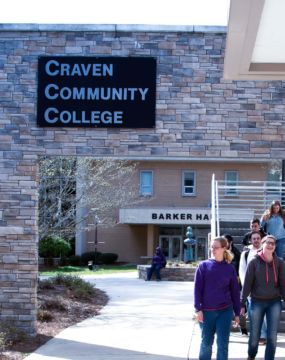Keep up with our latest demographic insights

Last week, we highlighted the programs of study where NC Community College graduates were making the highest average annual wages five years after graduation, as well as the percentage employed who graduated from that program. This week, we’re doing the same thing for UNC system graduates. This data comes from the NC Tower database, maintained by NC Department of Commerce, which provides aggregate information on degree attainment, programs of study, and wage/employment information from public postsecondary institutions in North Carolina. For…

One of many decisions that students transitioning from high school to postsecondary education are faced with is what program of study and credential to pursue. This can be challenging, since students are often not aware of the opportunities and salary potential associated with different careers. The NC Tower database can provide some insight into this important question. NC Tower is a web-based data delivery system, maintained by the NC Department of Commerce, which provides aggregate…

Nationally, 46% of women aged 25-64 reported having an associate degree or higher in 2017 compared to 39% of men, a gap of seven percentage points. In North Carolina, this gap was even larger: 48% of women had an associate degree or higher compared to 38% of men, a gap of 10 percentage points.Compared to men, North Carolina women are more likely to report the completion of an associate degree (11.9% vs. 8.3%), bachelor’s (23.3% vs. 20.1%), or master’s (9.8% vs. 6.8%) degree. Men are slightly more likely than women to hold a professional degree (1.8% vs. 1.7%) or a doctorate (1.3% vs. 1.1%).


Forty-three percent of North Carolina’s adults aged 25-64 held some type of postsecondary degree in 2017—just over 2.3 million residents in the state. This share has risen five percentage points since 2010, and ten since 2000. In total, North Carolina gained 932K working-age adults with an Associate degree or higher from 2000 to 2017, and among these adults, the level of degree attainment continues to rise. In 2000, the majority of NC adults aged 25-64…


Just over 656,000 veterans lived in North Carolina in 2017 according to the most recent American Community Survey estimates. This is a decrease of 10,000 veterans from 2016, a decline of 1.5 percent. Nationally, the veteran population decreased at a similar rate, declining from 18.5 million in 2016 to 18.2 million in 2017, a loss of 292,000 on veterans. While the veteran population has been steadily declining, the total adult population continues to grow. As…


Demographic changes in the composition of North Carolina’s child population will likely introduce new challenges to reaching any goal of increasing statewide educational attainment. In Fall 2017, 44 percent or 674,000 North Carolina public school enrollments were black, Hispanic, or American Indian students. Over the past 5 years, this group of students has grown twice as fast as the overall student population and is projected to continue to grow steadily for the next 5-10 years. Compared to the state average, North Carolina’s American Indian, black, and Hispanic students are: Less likely to report plans to continue their education after high school.Eighty-four percent of North Carolina public high school graduates reported plans to continue their education at either a four-year, two-year, or trade school in 2015. While most Hispanic (77%), American Indian (80%), and black (81%) students also report postsecondary plans, they are more likely than their white and Asian peers to report plans to enlist in the military or start employment instead.



Women’s History Month has its roots in various “Women’s History Week” celebrations dating back to the late 1970s. The commemoration was often anchored to the March 8th observance of International Women’s Day. As support for the celebration grew, Congress ultimately passed a resolution recognizing March 7, 1982 as “Women’s History Week”. In 1987, this event was expanded to the entire month in perpetuity. An annual Presidential Proclamation is now issued every March to recognize the…
Levels of postsecondary educational attainment have risen steadily in recent decades. In 1970, only 19% of North Carolina adults ages 25-64 had any postsecondary education, six percentage points less than the national rate of 25%. Though adult postsecondary attainment in the state increased in 1980 and again in 1990, a large gap remained between North Carolina and the nation. This gap narrowed to two percentage points in 2000. By 2010, postsecondary attainment in North Carolina…
The percentage of North Carolina adults with a bachelor’s degree or higher rose from 22.8% in 2001 to 28.6% in 2014, according to data from the American Community Survey. Asian-Americans had the highest educational attainment, with more than half of North Carolina’s Asian adults holding a bachelor’s degree or higher in 2014. Non-Hispanic whites also had higher rates of holding bachelor’s degrees than the state overall: 32.4%. The percentage of Asian adults holding a bachelor’s…
Educational attainment is critical to future success. For individuals, “educational attainment is a powerful predictor of well-being.” Higher levels of educational attainment are associated with higher wages, better health, and lower rates of unemployment. For communities and employers, education is vital to ensure a workforce capable of meeting future job requirements. Georgetown’s Center on Education and the Workforce predicts that 67% of North Carolina jobs will require some form of postsecondary education by 2020. Specifically:…
Your support is critical to our mission of measuring, understanding, and predicting population change and its impact. Donate to Carolina Demography today.